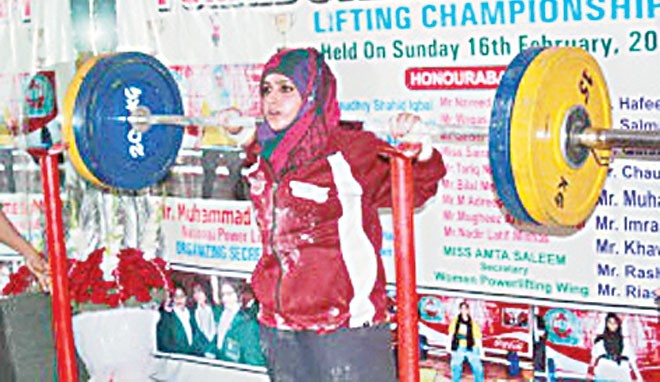

Women have always been conscious about how they look. Literature, art and history testify to this.
In the old times, it was the face more than any other part of the female body that drew the attention of poets and writers. But over the last one hundred years or so, the concept of ‘figure’ has become at least as important as the face.
This phenomenon may be attributed to the invention of cameras in the first place and to that of television later. Even in segregated societies, the mere feeling of having a good figure makes ladies go for fitness, maybe also to please their husbands.
In Pakistan also, the fitness craze is increasing. The opening lyrics of a popular Punjabi song of today ‘Lak 28, kuri da 47 weight kuri da’ also suggest this.
More and more women are joining gyms. First, it was aerobics only but lately our ladies have also turned to weight training which includes routines like bench press and squat.
In February 2013, a major breakthrough was made when the first ever women power-lifting competition was held in this country. The Lahore event was a success as around 35 women of different age groups competed.
It must be mentioned here that power-lifting comprises three types of lift: bench press, squat and deadlift.It was the brainchild of Aqeel Javed Butt, a former international at both power-lifting and weight-lifting.
The inaugural meet was held on the sidelines of the men’s competition, but as Butt had promised, the second competition, conducted in DHA Lahore last summer, was an exclusive ladies event.
The number of participants increased and the standard of the competition rose.Butt set his next goal. It had been only the Lahore girls so far. He planned to invite girls from other places as well for the next championship.
The latest (the third) competition, titled ‘Punjab Strongest Women Power-lifting Championship 2014’, saw participants coming to Lahore from not only big cities like Rawalpindi, Faisalabad and Gujranwala but also from small towns such as Daska.
For the first time, separate competitions for juniors (under-18) and seniors were held. The juniors vied in three weight classes, while there were eight for the seniors.
The competition was quite intense with new records in almost every category.Every class winner was awarded a belt and she also got richer as cash prizes were also given. Even mothers of the winners were awarded for supporting their daughters in the sport of power-lifting.
Some of the competitors were those who had represented Pakistan in other strong man/woman sports such as kabaddi and arm wrestling. This underscored the utility of power-lifting as a strength- enhancing discipline.
Most of the outstation girls were accompanied by some family member. One family from a village outside the small town of Daska caught the attention of everyone. Riasat Ali was present with his four daughters who lifted in different classes.
When asked about the reaction of his village folks, Raisat came out with a very interesting answer in chaste Punjabi. "Yes, they termed it a very queer activity for the girls. I told them, ‘You have no objection when these girls do all kinds of chores including carrying fodder for the cattle on their shoulders in the fields. It is you people who are reluctant to accept a girl as your daughter in law if she appears a little fat.’" One could not have a more convincing argument.
In this country where opportunities for girls to go out regularly for sports are very limited, power-lifting could be the prime activity for fitness. The sport requires only a small space. Riasat’s four daughters train at home.
One hears statements like ‘weight training will make women look like men’ from girls who are worried that lifting weights will make them look masculine.
It’s a myth. Lifting heavy weights does not bulk up women; only tones them up. This is because they have very little testosterone as compared to men -- about 15-20 times less. It is the different levels of testosterone which make men, men and women, women. The heavily muscled women appearing on some bodybuilding magazines are chemically altered. They owe their appearance to muscle-enhancing drugs.
Moreover, weight training is a part of the fitness schedules of most of the models and the beauty pageants’ contests, and who is more conscious of feminine looks than them.
Power-lifting makes females fitter without adding to weight. This way they can enjoy food and still stay fit.
Weight training has innumerable benefits for health. It prevents diseases like Type II diabetes, osteoporosis (weakening of bone), sarcopenia (weakening of muscles), cardiovascular diseases and high blood pressure.
Come on ladies, come on ladies, all time fitness!